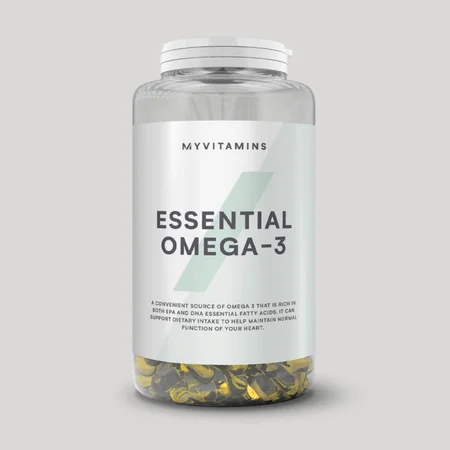
Your gut is home to trillions of microorganisms — tiny but mighty players that influence your digestion, immune system, and overall health. They can generally be divided into two camps: the good guys and the troublemakers.
The good guys help your body thrive. On the other side, the bad guys — often referred to as pathogens — can cause harm.
When this ecosystem is thriving, it supports your well-being and strengthens your body's defenses. But when the balance is off, it can lead to a variety of health issues. Here are some telltale signs to look out for.
- Signs Your Gut Microbiome Might Need Support
- How to Support and Improve Your Gut Health
- Supplements to Support Gut Health
- Other Gut-Supporting Supplements
- Lifestyle Tips for a Healthier Gut
Signs Your Gut Microbiome Might Need Support
Digestive issues
Symptoms of an upset stomach — like bloating, gas, constipation, and diarrhea — may be signs of an imbalance in the gut microbiome. Research has shown that conditions like irritable bowel syndrome (IBS) may be linked to shifts in gut bacteria.1
For instance, a study found reduced levels of beneficial bacteria bifidobacteria and lactobacilli and increased levels of harmful bacteria enterobacter in people with digestive disorders compared to healthy controls.1
Fatigue
Did you know that your gut health may impact energy levels? One study found that the severity of symptoms in people with chronic fatigue syndrome was associated with lower levels of gut microbes that can produce butyrate, a molecule important for gut heath.2

Frequent illness
Emerging research suggests that gut health is closely linked to the strength of the immune system. A study of people recovering from chemotherapy and stem-cell treatments found that certain gut microbes were associated with higher neutrophil levels — a type of white blood cell crucial for immune defense.
But at the same time, some microbes were linked to lower neutrophil counts, potentially indicating a weakened immune response.3
This highlights the complex relationship between the gut microbiome and immune function, underscoring the importance of maintaining a healthy gut to support overall immune health.

7 Easy Ways To Supercharge Your Immune System
Stay feeling your best with nutritionist-approved advice....
Skin problems
Although the “how” is not yet known, research suggests a link between gut health and skin conditions through the gut-skin axis. Some common skin conditions have been shown to be linked to dysbiosis or an imbalance in the gut.4
Food intolerances
Food intolerances may be a sign of an imbalance in the gut microbiome. Certain microbes can influence the development of food sensitivities and allergies.
For example, higher levels of ruminococcus gnavus and faecalibacterium prausnitzii have been found in the gut microbiomes of children with allergies.5 This suggests that an overgrowth of certain microbes may contribute to immune responses that trigger food intolerances or allergic reactions.
Mood swings
Research increasingly shows that gut health influences mood and mental well-being through the gut-brain axis — the communication pathway between the gut and brain.
One study found that individuals with generalized anxiety disorder (GAD) had lower diversity in their gut microbiome and fewer bacteria that produce short-chain fatty acids (scfas) — signaling molecules that play a crucial role in regulating the central nervous system, the processing centre that controls our thoughts and emotions.6,7
A word of caution
While the connection between gut health and overall well-being is promising, much research on the microbiome is still observational8 and more studies are needed to fully understand it and the mechanisms at play.
It’s also important to remember that these symptoms mentioned could be linked to other underlying causes. If you’re experiencing any symptoms, always consult a qualified healthcare professional for proper advice and support.

How to Support and Improve Your Gut Health
The good news? Restoring balance in your gut doesn’t have to be complicated. Nutrition, lifestyle changes, and supplements can all play a role in nourishing and rebalancing your gut microbiome.
Supplements to Support Gut Health
Apple Cider Vinegar (ACV) Gummies
ACV gummies offer a convenient and tasty way to enjoy the benefits of apple cider vinegar.
How they may help:
Rich in polyphenols, apple cider vinegar may stimulate the growth of beneficial gut bacteria. Although not a true probiotic, its fermentation process provides some probiotic-like benefits.11
Tip:
Start with a low dose and gradually increase it to avoid potential stomach sensitivity.
Turmeric & Ginger Gummies
These gummies combine two potent anti-inflammatory ingredients.
How they help:
Turmeric’s active compound, curcumin, supports the growth of beneficial bacteria.12 Ginger may act as a prebiotic, a type of non-digestible fibre that nourishes beneficial bacteria.13
Other Gut-Supporting Supplements
Probiotics: Capsules or powders containing beneficial microbes can help repopulate and diversify your gut.
Prebiotics or fibre supplements: these nourish good bacteria, promoting diversity and supporting a balanced gut environment.
Omega-3 Fatty Acids: Research suggests that omega-3 may help decrease the growth of “bad” and increase the growth of “good” bacteria.14
Don’t forget to consult a healthcare professional before taking any new supplements to ensure they’re appropriate for your needs.
Lifestyle Tips for a Healthier Gut
- Eat more fermented foods: natural sources of probiotics — such as yogurt, kefir, sauerkraut, and kimchi — can help diversify your gut microbiome.
- Increase fibre intake: whole grains, fruit, and vegetables are rich in prebiotics that help nourish good bacteria.
- Reduce processed foods and sugar: these can feed harmful bacteria, disrupting your gut balance.
- Stay hydrated: proper hydration supports digestion and your body’s ability to absorb nutrients.
- Manage stress: practices like mindfulness, yoga, or deep breathing can mitigate stress, which has a negative effect on gut health.

Why Fibre is So Good For You + 28 High-Fibre Foods
Good news: Popcorn made the list....
Take Home Message
Supporting your gut microbiome is a powerful step toward better overall health. The best part? There are simple changes you can make to your diet and lifestyle to help your microbiome thrive. By making better choices, you can nurture a healthier gut — and a healthier you!
FIND MORE HERE:

Probiotics 101: Everything You Need To Know
Hint: they support immunity and digestive health....

- Antonio, N., Andrea, T., Claudio, T., Beatrice, P., Pamela, C., Chiara, M., Gian, L. de’ A., Francesco, D. M., & Tiziana, M. (2018). Digestive disorders and Intestinal microbiota. Acta Bio Medica : Atenei Parmensis, 89(Suppl 9), 47–51. https://doi.org/10.23750/abm.v89i9-S.7912
- Guo, C., Che, X., Briese, T., Ranjan, A., Allicock, O., Yates, R. A., Cheng, A., March, D., Hornig, M., Komaroff, A. L., Levine, S., Bateman, L., Vernon, S. D., Klimas, N. G., Montoya, J. G., Peterson, D. L., Lipkin, W. I., & Williams, B. L. (2023). Deficient butyrate-producing capacity in the gut microbiome is associated with bacterial network disturbances and fatigue symptoms in ME/CFS. Cell Host & Microbe, 31(2), 288-304.e8. https://doi.org/10.1016/j.chom.2023.01.004
- Schluter, J., Peled, J. U., Taylor, B. P., Markey, K. A., Smith, M., Taur, Y., Niehus, R., Staffas, A., Dai, A., Fontana, E., Amoretti, L. A., Wright, R. J., Morjaria, S., Fenelus, M., Pessin, M. S., Chao, N. J., Lew, M., Bohannon, L., Bush, A., & Sung, A. D. (2020). The gut microbiota is associated with immune cell dynamics in humans. Nature, 588(7837), 303–307. https://doi.org/10.1038/s41586-020-2971-8
- De Pessemier, B., Grine, L., Debaere, M., Maes, A., Paetzold, B., & Callewaert, C. (2021). Gut–Skin Axis: Current Knowledge of the Interrelationship between Microbial Dysbiosis and Skin Conditions. Microorganisms, 9(2).
- De Filippis, F., Paparo, L., Nocerino, R., Della Gatta, G., Carucci, L., Russo, R., Pasolli, E., Ercolini, D., & Berni Canani, R. (2021). Specific gut microbiome signatures and the associated pro-inflammatory functions are linked to pediatric allergy and acquisition of immune tolerance. Nature Communications, 12(1), 5958.
- Cheng, J., Hu, H., Ju, Y., Liu, J., Wang, M., Liu, B., & Zhang, Y. (2024). Gut microbiota-derived short-chain fatty acids and depression: deep insight into biological mechanisms and potential applications. General Psychiatry, 37(1), e101374–e101374. https://doi.org/10.1136/gpsych-2023-101374
- Jiang, H., Zhang, X., Yu, Z., Zhang, Z., Deng, M., Zhao, J., & Ruan, B. (2018). Altered gut microbiota profile in patients with generalized anxiety disorder. Journal of Psychiatric Research, 104, 130–136. https://doi.org/10.1016/j.jpsychires.2018.07.007
- McGuinness, A. J., Stinson, L. F., Snelson, M., Loughman, A., Stringer, A., Hannan, A. J., Caitlin S.M. Cowan, Jama, H. A., Caparros-Martin, J. A., West, M. L., & Wardill, H. R. (2024). From hype to hope: Considerations in conducting robust microbiome science. Brain Behavior and Immunity, 115, 120–130. https://doi.org/10.1016/j.bbi.2023.09.022
- Majeed, M., Nagabhushanam, K., Paulose, S., Arumugam, S., & Mundkur, L. (2023). The effects of Bacillus coagulans MTCC 5856 on functional gas and bloating in adults: A randomized, double-blind, placebo-controlled study. Medicine, 102(9), e33109. https://doi.org/10.1097/md.0000000000033109
- Otten, A. T., Bourgonje, A. R., Peters, V., Alizadeh, B. Z., Dijkstra, G., & Harmsen, H. J. M. (2021). Vitamin C Supplementation in Healthy Individuals Leads to Shifts of Bacterial Populations in the Gut—A Pilot Study. Antioxidants, 10(8), 1278. https://doi.org/10.3390/antiox10081278
- Jafarirad, S., Elahi, M., Mansoori, A., Abdollah Khanzadeh, & Mohammadhossein Haghighizadeh. (2023). The improvement effect of apple cider vinegar as a functional food on anthropometric indices, blood glucose and lipid profile in diabetic patients: a randomized controlled clinical trial. Frontiers in Clinical Diabetes and Healthcare, 4. https://doi.org/10.3389/fcdhc.2023.1288786
- Scazzocchio, B., Minghetti, L., & D’Archivio, M. (2020). Interaction between Gut Microbiota and Curcumin: A New Key of Understanding for the Health Effects of Curcumin. Nutrients, 12(9), 2499. https://doi.org/10.3390/nu12092499
- Wang, J., Chen, Y., Hu, X., Feng, F., Cai, L., & Chen, F. (2020). Assessing the Effects of Ginger Extract on Polyphenol Profiles and the Subsequent Impact on the Fecal Microbiota by Simulating Digestion and Fermentation In Vitro. Nutrients, 12(10), 3194. https://doi.org/10.3390/nu12103194
- Fu, Y., Wang, Y., Gao, H., Li, D., Jiang, R., Ge, L., Tong, C., & Xu, K. (2021). Associations among Dietary Omega-3 Polyunsaturated Fatty Acids, the Gut Microbiota, and Intestinal Immunity. Mediators of inflammation, 2021, 8879227. https://doi.org/10.1155/2021/8879227









